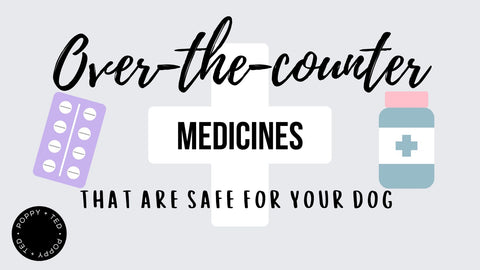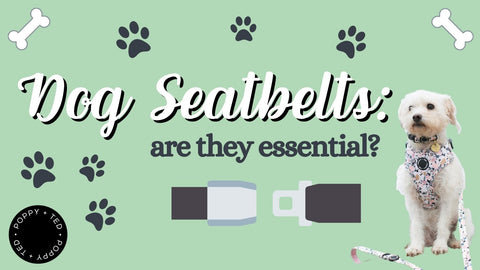It can be a difficult time when our beloved pooches are poorly, especially because they can’t communicate with us how they’re feeling or understand that they will get better. Of course, we want to make them feel better as quickly as we can. But when it comes to the sniffles or feeling run down, it’s not always a costly trip to the vet they need.
To help you help your dogs, our team here at Poppy + Ted have put together a quick and simple guide on giving over-the-counter medicines to your canine friends. You can find the information you need from what medications are suitable to find the correct dosage.
Please be advised that if you are concerned about your dog’s health, you should seek advice from a veterinary professional.
Is Over-the-Counter Medicine Safe for Dogs?
Some over-the-counter (OTC) medicine is safe for dogs, but not all are. You can not assume that any OTC is suitable for your dog because they don’t require a prescription. Giving your dog a medication unsuitable for them can lead to toxic effects, so you must be careful and seek professional advice if you’re unsure.
5 Over-the-Counter Medications You Can Give Your Dog
To help you understand what OTC medications are safe for dogs, here is a list of options you might consider. As well as information on possible side effects for dogs that you should consider before giving to your pets.
1. Loperamide (Imodium)
Loperamide is an over-the-counter drug used to treat diarrhoea and is branded as Imodium. It is effective for short-term relief of diarrhoea for your dog by easing their discomfort and preventing dehydration. If the effects of diarrhoea continue or your dog exhibits other symptoms, too, you should seek further advice from the vet.
Dosage: Only give your dog one dose of loperamide, measured at 1mg per 20 lbs of body weight.
2. Antinauseants (Pepto-Bismol)
Other diarrhoea relief medications are also suitable for dogs, such as the antinauseant, Pepto-Bismol. However, this medication is also used to ease the discomfort of acid reflux and upset stomachs. If your dog vomits the dose of Pepto-Bismol, consult your veterinarian as soon as possible.
Dosage: Give your dog 1 teaspoon of this medication for every 10lbs of body weight.
3. Antihistamines (Benadryl)
To effectively relieve allergy and hayfever symptoms, you can give your dog antihistamines like Benadryl. However, it should be noted that while effective, some dogs may experience side effects, such as drowsiness or hyperactivity.
Dosage: For treatment for vomiting or diarrhoea, give your dog 1 teaspoon for 5-10 lbs of body weight.
4. Steroid Sprays, Creams & Gels
If your dog has a superficial wound or insect bite, you can apply an OTC steroid gel, cream, or spray to decrease the itching felt by your dog. However, while these medications may relieve the pain or irritants associated with the wound, the steroids can delay the healing rate. If you notice your dog’s wound has not cleared after a few applications, you should have it checked by your dog’s veterinarian.
5. Hydrogen Peroxide
Hydrogen peroxide can be used on dogs for two different purposes. Firstly, you can use hydrogen peroxide to clean superficial wounds on your dog to keep them clean and increase the speed of healing. It can also be given orally to your dog to induce vomiting if they have eaten something harmful.
Dosage: Before giving your dog an oral dose of hydrogen peroxide, contact your vet to explain the situation and follow their advice on how much to give.
OTC Medicines You Should Never Give Your Dog
As we have established, some OTC medications are safe for dogs. However, this does not mean that any TC medicine is safe for dogs. No matter how quickly you want them to feel better or how badly you wish you could ease their pain.
You should always seek expert advice from your veterinarian. However, we have pulled together some over-the-counter medicines that are unsafe for your dog. You may have many OTC medicines in your cupboard, but you should avoid giving your dog the following OTC medications:
- Paracetamol: Painkillers like paracetamol are common for humans to take to aid in the relief of headaches and other everyday pains. It can be tempting to give to our pets when we notice them wince or limp, but paracetamol is toxic to small animals. This is because they can not metabolise the medication like humans, and overdoses can lead to liver failure and red blood cell damage.
Keeping Your Dog Fit and Healthy
We hope you have found the information you need here to keep your dog safe even when they’re feeling under the weather. Just be cautious about what you decide to give to your dog; if you’re unsure, always consult your veterinarian first. If your dog continues to exhibit concerning symptoms, take them to the vet for examination and further advice.
You can also keep your dog fit and healthy with plenty of walkies and grooming sessions that keep them feeling amazing. Plus, regular exercise for your dog can also help with their mental health.
So, find the essentials you need for regular fun and safe walkies for your pup today, like leads, poop bags and more. Don’t forget grooming essentials to get rid of dirt and muck after especially adventurous days out.
Related
Is Human Shampoo Safe for Dogs?



